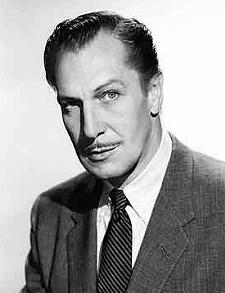
This Sunday will mark the sixteenth anniversary of the death of a horror film legend. October 25th, 1993, Vincent Price left this mortal coil. The horror films that Vincent Price starred in were not the violent shockfests people so often imagine when they thing of the words "horror film." His films were not about gore, or quick cathartic release of tension, rather they were about
fear. H.P. Lovecraft, a pioneer in American "Wierd Fiction", wrote in his essay
Supernatural Horror in Literature :

5-27-1911 to 10-25-1993
The oldest and strongest emotion of mankind is fear, and the oldest and strongest kind of fear is the fear of the unknown...their admitted truth must establish for all time the geniuneness and dignity of the wierdly horrible tale as a literary form. Against it are discharged all the shafts of a materialistic sophistication which clings to frequently felt emotions and external events, and of a naively insipid idealism which deprecates the aesthetic motive and calls for a didactic literature to "uplift" the reader toward a suitable degree of smirking optimism...men with minds sensitive to hereditary impulse will always tremble at the thought of the hidden and fathomless worlds of strange life which may pulsate in the gulfs beyond the stars...
This horror of the unknown is the kind of horror that permeated the films of Vincent Price. To be sure some like the
Tingler had moments of visual shock, but most of the horror in Price's films was internal to the viewed characters. The audience felt the horror not as an immediate thing which passes when the musical sting chimes, but as a lingering afterthought which remained with the viewer long after the film had been viewed.
An image from The Tingler more akin to modern horror.
Vincent Price and Roger Corman's screen adaptations of Edgar Allen Poe tales are some of the best examples of this lingering kind of fear. With modern special effects making the imagery in
The Pit and the Pendulum tame, possibly completely enervated of shock value, in comparison to the slaughter a Jason Voorhees is capable of committing. It is not the violence in
Pit which horrifies, it is the thought of what man is capable of doing. This is the best kind of fear, the fear that reminds us as we look into the abyss that the abyss is looking back into us. True fear is horror at the possible meaninglessness of existence and the potential cruelty of man. How horrible is the realization in
Fall of the House of Usher that Roderick Usher had accidently put his living sister prematurely into the tomb? The audience who watches this film can imagine both having to dig oneself free of an early grave and the terror of realization Roderick comes to when he realizes what he has done. There but for the grace of God go I.
Edgar Allan Poe is the founding voice for a great deal of American literature, including the modern horror tale. There have been some more recent Poe translations than the Corman/Price collaborations, but none seem to capture the tone as well. Price is magnificent in roles where we get to watch an otherwise noble man descend into madness. The Corman/Price films also manage to capture hints of the "unreliable narrator" literary device that Poe was famous for using/inventing. The lens through which the audience views the scene isn't the unreliable narrator, but the characters themselves often conceal their real motivations from each other. Have fun this Halloween with horror whose legacy can be seen in the SAW series, and the first HOSTEL, though the Poe versions spend a little more time on psychology of terror and less on the visceral sensations.














